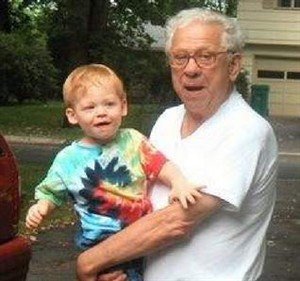
Share Your Memory of
Kurt
Obituary of Kurt Weinbach
Kurt Weinbach
September 20, 2010 at age 82. He is survived by his loving wife of 50 years, Sheila (Gissin); devoted children, David (Julie) & Susan Weinbach; grandsons, Aaron Max Reingold & Alexander Joseph Weinbach; brother-in-law, Arnold (MaryJane) Gissin; nieces & nephews. Predeceased by his brother, Bert.
Born in Vienna, Kurt escaped from the Nazis to China with the aid of a German General . Later, he served in the Israeli Army. He was President of the Purchasing Agents of Rochester & other organizations.
Funeral Services will be held on Wednesday, September 22, 2010 at 10 AM in the Main Sanctuary of Temple Beth El (139 Winton Rd. S.). Click here for directions to the temple. Interment, Mt. Hope Cemetery. Following the funeral a period of mourning will be observed at 70 Stanford Dr., Wednesday, September 22, 2010 from 1-4 PM and will continue Sunday, September 26, 2010 from 11 AM-8 PM. Click here for directions to the house of mourning. Donations may be made to the Weinbach Advised Fund
c/o Jewish Community Federation of Greater Rochester
441 East Avenue
Rochester, New York 14607 Link to the Jewish Federation
or
United Way of Greater Rochester
75 College Avenue
Rochester, New York 14607-1009 Link to the United Way Wartime youth didn't hinder Kurt Weinbach's ability to love
Mark Hare • Senior editor • October 31, 2010 -Rochester Democrat & Chronicle
Kurt Weinbach "was always an optimist, and always funny," says Sheila Weinbach, his wife of 51 years. And when he talked about growing up in Austria under Nazi rule, "he never told people how the Nazis killed family and friends. He told people how their (Gentile) neighbors saved his father's store on Kristallnacht" — Nov. 9, 1938, the "night of breaking glass" when Nazi mobs rampaged through Vienna destroying Jewish businesses and synagogues. "He wanted people to know they could make a difference," she says.
Kurt Weinbach, 82, died in late September. His wartime childhood formed the man he became but did not leave him bitter and angry. Instead, he learned to love life and the people in his.
Israel Weinbach, Kurt's father, served in the Austrian army during World War I as a clerk and unit photographer — who, on trips to Vienna to buy film, would deliver photos to the families of soldiers he knew.
After the war, he returned to his watchmaking business in Vienna. When the Germans annexed Austria in 1938, Gen. Heinrich Stumpfl, Israel Weinbach's commanding officer during the war, was put in charge of Vienna.
Kurt's father sent the general a congratulatory letter and was invited to visit him at the elegant Hapsburg palace. He took young Kurt with him so that the boy could be a messenger to the family in the event something happened to the father.
The meeting was friendly, and the general, who liked the elder Weinbach, promised to alert the family when it was time to leave. He kept his word, advising them to get out of Austria in early 1941 or risk losing their lives.
Getting out was easier said than done. Few countries were taking Jews at the time, but Kurt's older brother, Bert, had made it safely to China and the family followed, settling in Tientsin (now Tianjang), a city near Beijing. Bert and Gen. Stumpfl arranged for them to travel on the Trans-Siberian Railroad, Sheila says, a glorious train and a beautiful ride, despite the circumstances.
"And Kurt got a souvenir" in Siberia, she says. Like all 12-year-olds, he took advantage of a stop to make a snowball, without his gloves, and wound up with frostbite, the scars from which he displayed for the rest of his life. In China, Kurt attended a Jewish school and learned Russian, Chinese, Japanese and English. The family arrived in Tientsin during the Japanese occupation, but soon the U.S. Marines arrived, 40,000 strong, Sheila says. And because Kurt could speak both English and Chinese, the American commander enlisted his help in billeting the troops. "He loved it," she says. "He would go to a building owner and say, 'In the name of Harry Truman and the United States government, I am confiscating your building.'"
After the war, the Weinbachs eventually made their way to Israel, where Kurt served in the new Israeli army. In 1957, his mother, by then widowed, wanted to reunite the family in the United States; Bert had already settled in Rochester. The family arrived in 1958.
"We met in 1959 at the International Folk Dance Festival at the YWCA," Sheila says. "We soon organized a singles club at the JCC (Jewish Community Center)," and they were married in 1960.
Kurt had lived in four countries, seen the horrors of war, witnessed the birth of a new nation and spoke a dozen languages. He landed a job as a purchasing agent for Rochester Telephone and later, Frontier Communications.
He had an eye for the deal, Sheila says, and he was a natural as a purchasing agent. The only concession to a childhood of hardship and shortages, she says, was a tendency to over-buy. "We always had so much stuff, portable radios, flashlights, batteries, even TVs."
Kurt was well-traveled, but "I was a simple Joseph Avenue girl," Sheila says, born and raised in Rochester, graduating from Franklin High School. Her father, Morris Gissin, ran an electrical supply store on Joseph, and was a self-taught painter who captured vivid images of life along the avenue — many of which hang in the Weinbachs' Brighton home, along with hundreds of Kurt's family photos, important documents the family carried on their escape from Vienna and paintings done by Kurt's mother. They liked to be reminded every day of the family history, and to let their eyes fall on images and words that meant so much to them. Sheila and Kurt had two children, son David and daughter Susan. There are two grandsons.
In the eulogy she delivered for her father, Susan referenced her childhood: "He was the father who could turn the most mundane things into 'ancient Chinese secrets,' who taught us how to count to 10 in Hebrew, German, Chinese and Japanese, who took us along on business trips to places of great historic value, like Elmira ..." He was a wonderful father, Sheila says, "because he knew what mattered in life and he never sweated the small stuff." Both Weinbachs loved Rochester and were huge boosters, promoting all their city has to offer to friends and acquaintances and talking full advantage of its culture, especially the Rochester International Jazz Festival.
Kurt retired at 61. "His motto was, 'When the kids are educated and the mortgage is paid, you should only work if you're having fun,'" Sheila says. But in retirement, "We weren't much for watching TV," she says. In the summer, they attended concerts nearly every night, and enjoyed lectures and dancing — to almost any kind of music.
And Kurt continued, as he had since he arrived in Rochester, to tell his survivor's story wherever he was invited — at schools, service clubs, senior living centers, churches. He always felt it was important to share the story, to talk about the power of human resiliency, of faith of family. "And when we would travel," Sheila says, "we would ride public buses and go to supermarkets. Kurt wanted to see how people really live, what they buy and how they work. That's what interested him."
Over the years, Sheila says, she met many survivors like Kurt. They didn't have a higher than average incidence of mental illness, she says, because they often came from loving backgrounds, with parents and grandparents and aunts and uncles who cared for each other. "Even those who were the only survivors in their families," she says, "still have a zest for life."
That was Kurt Weinbach.
Home
Brighton, New York
Birthplace
Vienna



